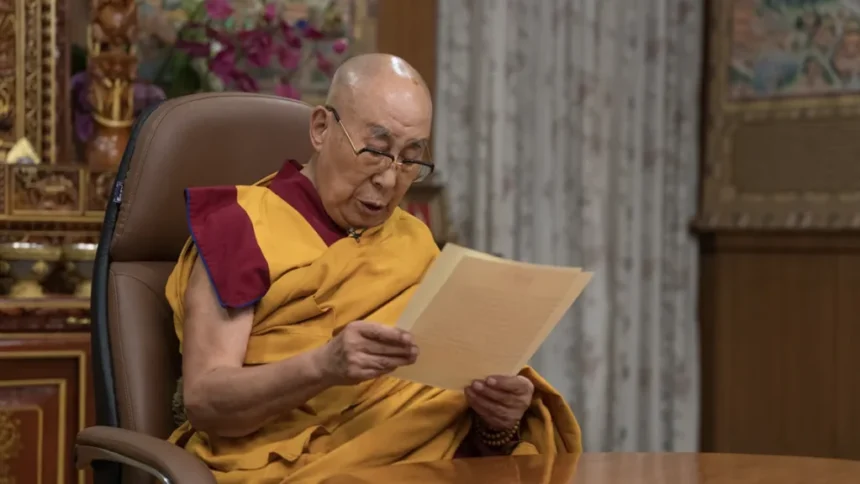The Dalai Lama announced this Wednesday that he will have a successor after his death, thus continuing the centuries-old tradition that has become a flashpoint in the struggle with China’s Communist Party for the future of Tibet.
The spiritual leader of Tibetan Buddhism made the declaration via a video message addressed to senior religious elders, who are gathered in Dharamshala, India, where the Nobel Peace Prize laureate has lived since fleeing Tibet after a failed uprising against Chinese communist rule in 1959.
“I am asserting to you that the institution of the Dalai Lama will continue,” he said in the recorded video, citing requests he has received over the years from Tibetans and Tibetan Buddhists urging him to do so.
Succession Process and China’s Stance
“The Gaden Phodrang Organization has the sole authority to recognize the future reincarnation. No one else has any such authority to interfere in this matter,” he added.
The Dalai Lama stated that his office must carry out the procedures for searching and recognizing the next Dalai Lama “in accordance with past tradition,” without disclosing further details on the process. He had previously declared that when he was around 90 years old, he would consult with the senior lamas of Tibetan Buddhism and the Tibetan public to re-evaluate whether the institution of the Dalai Lama should continue.
This declaration comes just days before his 90th birthday this Sunday, setting the stage for a difficult battle over his succession between Tibetan leaders in exile and China’s atheist Communist Party, which insists that only it holds the authority to approve the next Dalai Lama.
When asked about the Dalai Lama’s statement, a spokesperson for the Chinese Foreign Ministry reiterated Beijing’s long-standing position that the spiritual leader’s reincarnation must be in accordance with Chinese laws and regulations, with the search and identification carried out in China and approved by the government.
A Future of Rival Dalai Lamas?
In a March publication, the Dalai Lama declared that his successor would be born in the “free world” outside China, urging his followers to reject any candidate chosen by Beijing. This could potentially lead to the emergence of two rival Dalai Lamas: one chosen by his predecessor, the other by the Chinese Communist Party.
“Both the Tibetan community in exile and the Chinese government want to influence the future of Tibet and see the next Dalai Lama as key to doing so,” said Ruth Gamble, an expert on Tibetan history at La Trobe University in Melbourne, Australia.
How the Dalai Lama is Chosen and the Succession Battle
Tibetan Buddhists believe that their high monks reincarnate after death, and a Dalai Lama is chosen by Buddhist officials if they are convinced that the chosen one harbors the spirit of his predecessor. The current, 14th Dalai Lama, was identified as the reincarnated one when he was just two years old. In March, he had announced that his successor would be born outside China and that he would publish more details near his 90th birthday. This is a significant declaration as he had previously stated that the line of spiritual leaders might end with him.
During a life in exile, the 14th Dalai Lama, Tenzin Gyatso, has become synonymous with Tibet and the country’s pursuit of true autonomy under Beijing’s control in the Himalayan region. From his hometown of Dharamshala, where he established a government-in-exile, the spiritual leader has united Tibetans still living in the country and those in exile by raising their plight on the global stage. This has made the Dalai Lama a problem for Beijing, which considers him a “dangerous separatist” and a “wolf in monk’s robes.”
Since the 1970s, the Dalai Lama has asserted that he no longer seeks full independence for Tibet, but “meaningful” autonomy that would allow Tibetans to preserve their distinct culture, religion, and identity. His commitment to the “middle way” and non-violent approach has secured him international support and earned him the Nobel Peace Prize in 1989.
The Dalai Lama has long been wary of Beijing’s attempts to interfere in the reincarnation system of Tibetan Buddhism. Tibetan Buddhists believe in rebirth and that when a spiritual master like the Dalai Lama dies, he will be able to choose the place and time of his rebirth through the force of compassion and prayer.
However, religious tradition has increasingly become a battleground for control of Tibetan hearts and minds, especially since the contested reincarnation of the Panchen Lama, considered the second-highest figure in the faith. In 1995, years after the death of the 10th Panchen Lama, Beijing appointed its own Panchen Lama in opposition to the Dalai Lama, but the chosen six-year-old boy has since disappeared from public view.
According to Tibetan tradition, Dalai Lamas and Panchen Lamas have long played key roles in recognizing each other’s reincarnation. Experts believe Beijing will seek to interfere with the current Dalai Lama’s succession in a similar manner. Tibetan Buddhist religious leaders gathered this Wednesday declared that they “strongly condemn the use of the reincarnation theme by the People’s Republic of China for their political gain” and “will never accept it.”
For his part, the current Dalai Lama has made it clear that any candidate appointed by Beijing will lack legitimacy in the eyes of Tibetans or followers of Tibetan Buddhism. “It is completely inappropriate for Chinese communists, who openly reject religion, including the idea of past and future lives, to interfere in the reincarnation system of lamas, let alone that of the Dalai Lama,” he wrote in his latest memoir.







